Cocksedge & Co.
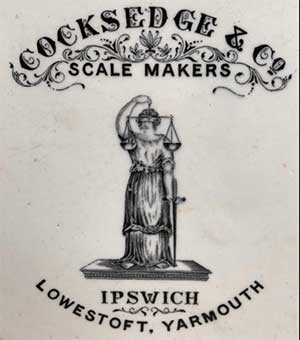
In 1879 J. S. Cocksedge left the firm Woods, Cocksedge and
Warner of
Suffolk Iron Works, Stowmarket (established in 1812) to founded
Cocksedge & Co. of Greyfriars Road. J. S. Cocksedge died in 1887.
In 1900 new premises were opened by the compnay in Rapier Street. The
company was the maker of the Gerald Gray Patent Self-Slewing Crane and
this utilised two small steam engines. In 1961 they were listed as
constructional and general engineers and iron founders; specialists in
manufacture of sugar machinery with 600 employees. [Information from Grace’s Guide, see Links]
… engineering was the largest employer [in Ipswich], both in terms of
the numbers involved and in the size of the final product. Ransomes and
Rapier in particular exported sizeable machines to the developing
world. It is said that in the 19th Century Ipswich exported more goods
than any other port in the country. It is no surprise that the
industrial activities of Ipswich, with its connections by sea and rail
(road transport was still horse drawn) attracted new business from
rural Suffolk. One such engineer was James Samuel Cocksedge, who had
been employed with Woods & Company of Stowmarket, a firm founded in
1812. Cocksedge had already sent his sons elsewhere to gain their
apprenticeships (and knowledge of how other firms operated) when he
decided to take an opportunity to buy a small engineering company in
Grey Friars Road in Ipswich and make it his own.
The Grey Friars Road business included a small foundry, an engineering
shop and a pattern shop (wooden shapes were made, pressed into green
sand, removed and the depression filled with molten metal which took
the same shape as the ‘pattern’. Cocksedge initially employed 12 men
and the business was established. The first of his sons (James Woods
Arthur Cocksedge) returned from London, apprenticeship complete, to
help in the family firm. Expansion was immediate and they purchased
premises across the road from their original works.
When the second son, E.H. Cocksedge, returned from India with expertise
in structural engineering (steel framed buildings) he persuaded his
brother that this was the direction the company should take. This
decision was the making of the firm; they spotted an opportunity, a gap
in the emerging market and adapted to supply the growing demand.
Structural engineering was the new method of building with larger and
taller buildings pushing the known boundaries of traditional
construction. Cocksedge’s erected the three original steel-framed
grandstands at Newmarket racecourse, a bridge on the first Colchester
by-pass and the steel frames of the factory for Fisons, Packard and
Prentice. They went on to become one of the region’s most significant
structural steel fabricators, supplying everything from single steel
beams to erecting some of the largest buildings in East Anglia.
Three of the stands at Newmaket race course were erected by them, as
also were the Colchester by-pass bridge, Fison, Packard &
Prentice's fertiliser factory at Ipswich, the Silver Queen bus station
at Clacton, the Playhouse in Colchester, the Bandstand at Dovercourt,
numerous garages, aerodromes, warehouses, barnes and covered riding
schools. The company has erected some of the largest steel structures
in East Anglia.
In 1903 they opened a new production facility in Rapier Street which in
time became their headquarters. Their slight disadvantage with this
move is that they were never as prominent in the street scene as either
Ransomes’ or Ransome and Rapier. There was an agreement to supply
electricity on 19 June 1934 between the Mayor, Aldermen and Burgesses
of the Borough of Ipswich and Cocksedge & Co. Ltd. for their
premises in Rapier Street. The company folded in the recession of
the early 1980s.
[Information from Ipswich Icons, by John Norman. EADT, 18 Oct, 2015]
The Cocksedge & Co. namestyle and illustration shown here is an Edwardian
promotional decoration on a large white ironstone plate found on www.theantiquekitchen.co.uk. It
shows the figure of Justice holding scales and a sword to promote the
company as 'scale makers' – a product not mentioned in the 1934
advertisement lists shown below – however, see the weighing scale
photograph from the Suffolk Punch Trust towards the bottom of this
web-page..
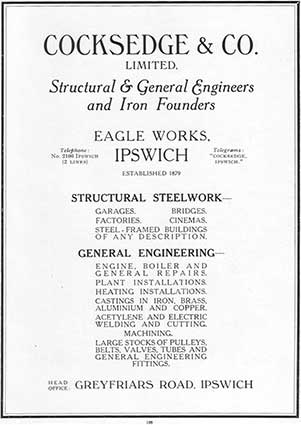 1934
advertisements
1934
advertisements 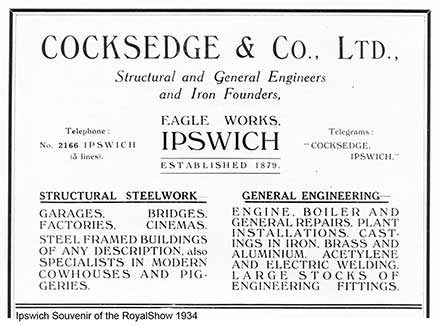
For the location of Eagle Works, the triangular site
south of Ransomes & Rapier works on Griffin Wharf, which was
home of the Cocksedge foundry can be seen on the
1973 map of the Ipswich docklands.
[UPDATE 22.1.2023:
'Some of the trifles I collected as a youth were old gas lamp posts
which were being removed from Ipswich streets and sold off for a song.
(They do make very solid linen posts.) Two show reasonably clear
markings, and I guess the other two identical posts would have had the
same. I am afraid I cannot tell you which street they came from! Nick
Wiggin.' Thanks to Nick for finding
another product of Cocksedge & Co. in Ipswich and now at his home;
the image has been turned on its side to aid readability 'COCKSEDGE']
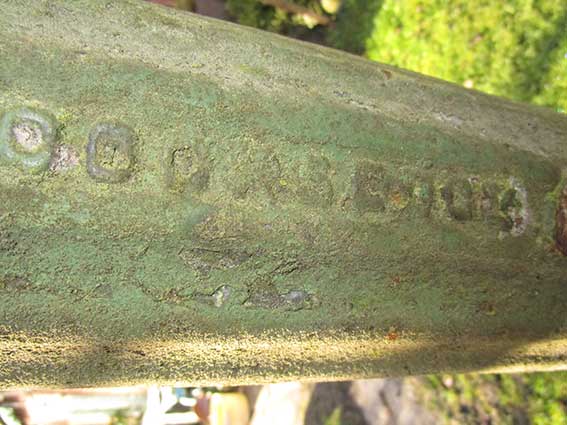 Image courtesy Nick Wiggin
Image courtesy Nick Wiggin
[UPDATE July 2025:
'I have recently refurbished
the Village Sign at Whissonsett, a small village some 4 miles south of
Fakenham. The sign features two sons of the former rector of the
village, one of whom, Derek Antony Seagrim, was awarded the VC and the
other Hugh Paul Seagrim the GC. (Worth a quick search on Google if you
have never heard of them). Unusually, the post is of cast iron and cast
by Cocksedge. The sign was unveiled in June 1985 – so, shortly before
the firm folded, I think. Photos attached. I have only known steel or
oak posts used on Village Signs though my knowledge is not extensive.
Presumably there must be others though. Robert Walden.' Thanks very much to Robert for the
photographs and information. The casting has a close resemblance to the
gas lamp post sent in by Nick Wiggin (shown above). Robert adds: 'I
have since met the elderly man who procured the casting of the Sign
(using wet black sand as his mould). However he tells me the Cocksedge
cast iron post was bought from a scrapyard in Essex c.1984. He says (he
understood) the post was originally used for gas lighting in
London! Robert.']
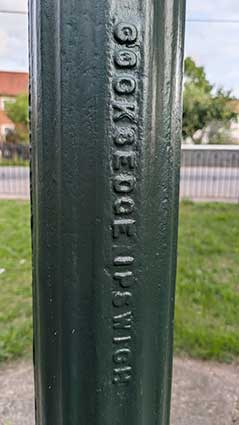
 2025 images courtesy Robert Walden
2025 images courtesy Robert Walden
[UPDATE
23.1.2023: Sandy
Phillips writes 'My ex-husband worked for Cocksedge in the early 1980s.
I believe they went into administration in the mid-'80s. I got married
on 20 September 1986 and he got made redundant just before this. He and
his father worked as electro-magnetic paint sprayers for the
castellated beam side of the Cocksedge foundry. His father was made
redundant first after many years service and, as both father and son
were residing in the house at the time of this, it made relations a bit
strained within the family! Peter was soon made redundant too, after
delivering drums of paint to the firms that had contracted work to
Cocksedge. Peter was to find that this was his last job with Cocksedge
as the redundancy notice was waiting for him when he returned home.
I attach a Cocksedge drain, in case you don't have one.' Many thanks to Sandy for the contributions
to the website; personal/family recollections of the great Ipswich
industries are valuable. The street drain cover (note the traces of the
double yellow parking lines) bears the words 'COCKSEDGE ... IPSWICH' in
rather fine serif'd capitals. Sandy tells us that the location
of the drain cover is in Gibbons Street, directly under the 'Elliott Street Bakery' sign.]
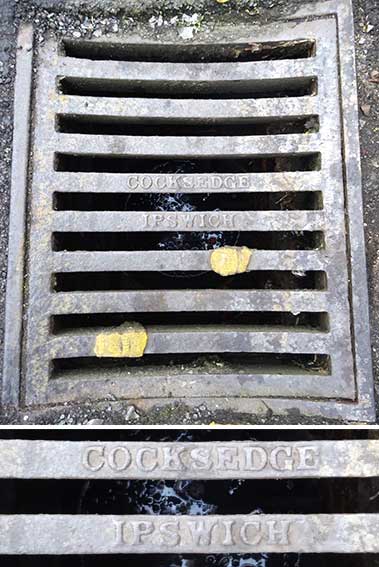 2023 images
courtesy Sandy Phillips
2023 images
courtesy Sandy Phillips 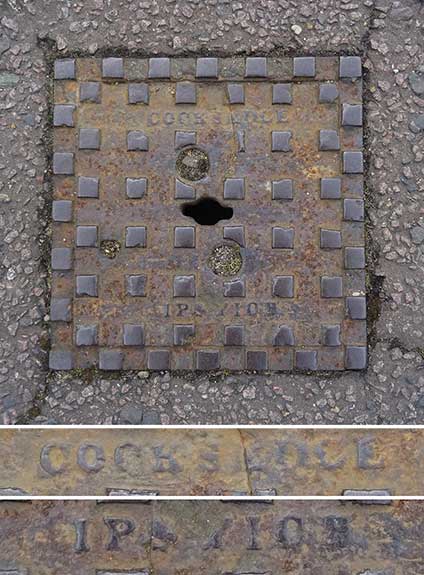
The second example (above) shows a
studded cover in
Emlen Street. It is in the middle of the road (explaining why the lettering is so worn) as
you approach the Walton House car park.
Meanwhile, at the Suffolk Punch Trust,
Hollesley...
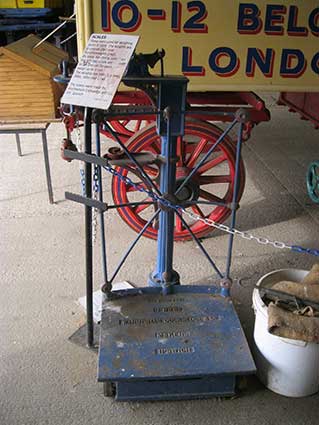
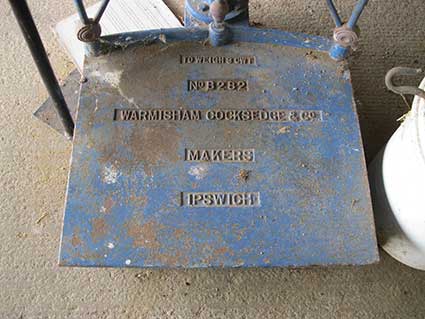 2017 images
2017 images
'TO WEIGH 3 CWT
NO. B282
WARMISHAM COCKSEDGE & CO
MAKERS
IPSWICH'
The sign reads: ‘SCALES. These were used for weighing
sacks of
corn. The weights are in pounds (lbs) and hundredweights (cwt). By
using the sliding weight on the arm, the scales are accurate to 4oz.
[ounces] and can be used to weigh up to 3 cwt. The weights are 14lb (1
stone), 28lbs, 56lbs and 1 cwt.’. The first evidence of specialist
scale-makers in Suffolk dates from the 1850s. Before 1860 the London
scale-maker Samuel Warmisham
had set up a branch in Ipswich. The firm was bought by the
large engineering firm Cocksedge & Co. around 1890
(eventually taken over by Averys in 1936).
Further Cocksedge castings can be seen on:-
- a large cast dock bollard by Cocksedge, see our
Dock ground level page under
'Bollards';
- Garden railings and gates in Salisbury
Road;
- the Symonds page
for a
lettered steel beam by Cocksedge in Carr Street;
- a drain cover near the Martyrs memorial in Christchurch park;
- a pavement grating in Museum Street;
- Cocksedge pavement drainage lettering in
Hadleigh.
What we can draw from these extant examples is that, at least in
Ipswich, the large steelwork structures and heavier engineering
products of Cocksedge & Co. promoted in their advertisements shown
at the top of this web-page are absent and the company name lives on in
much more pedestrain (pun intended) castings.
Related pages:
See our Castings page.
See also our Street furniture page.
Home
Please email any comments
and contributions by clicking here.
Search Ipswich
Historic Lettering
©2004
Copyright
throughout the Ipswich
Historic Lettering site: Borin Van Loon
No reproduction of text or images without express written permission

 2025 images courtesy Robert Walden
2025 images courtesy Robert Walden
 1934
advertisements
1934
advertisements 
 Image courtesy Nick Wiggin
Image courtesy Nick Wiggin
 2025 images courtesy Robert Walden
2025 images courtesy Robert Walden 2023 images
courtesy Sandy Phillips
2023 images
courtesy Sandy Phillips 

 2017 images
2017 images